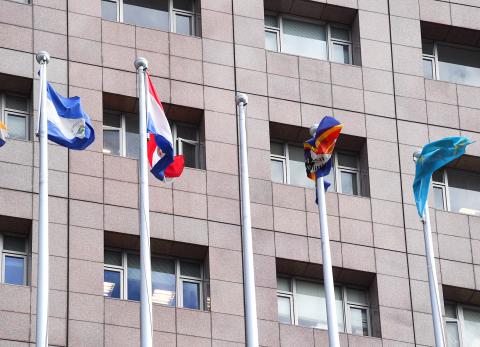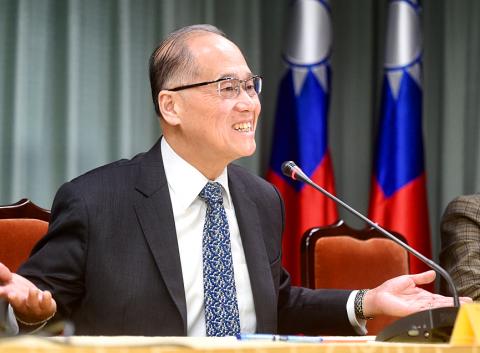The government yesterday expressed its regret over Sao Tome and Principe’s decision to cut its 19-year-old diplomatic ties with Taiwan, acknowledging that “gambling behavior” by the African nation was prompted by Taipei’s denial of its request for an exorbitant amount of financial aid.
Speaking at an impromptu news conference in Taipei, Minister of Foreign Affairs David Lee (李大維) said that to safeguard the nation’s dignity, Taiwan would immediately cut its diplomatic ties with Sao Tome and Principe, shutter its embassy and halt any cooperative programs with the African nation.
“Since the establishment of diplomatic ties in May 1997, Taipei has assisted Sao Tome and Principe in promoting national development, with our bilateral cooperation touching upon the areas of public health, medicine, agriculture, basic infrastructure, energy and education,” Lee said.

Photo: CNA
Singling out Taiwan’s antimalarial scheme in the African nation, Lee said thanks to continuous efforts by Taiwan’s malaria prevention counseling delegation, malaria incidence in Sao Tome and Principe fell from 50 percent in 2003 to 1.01 percent last year.
Despite Taipei’s determination to do its utmost to help its diplomatic allies promote national development, Lee said Sao Tome and Principe’s financial hole is simply too deep for Taiwan to deal with.
“Accordingly, it disregarded its nearly 20-year friendship with us and approached both sides of the Taiwan Strait to seek the highest bidder. We regret and deplore Sao Tome and Principe’s reckless and unfriendly decision,” Lee said.

Photo: Chien Jung-fong, Taipei Times
He added that the incident would not cease Taipei’s resolve to expand the nation’s international space and push its “steadfast diplomacy.”
Asked to confirm media reports that Sao Tome and Principe had asked the government for NT$6.4 billion (US$199.9 million), Lee declined to reveal the actual amount.
“It did ask for an astronomical number, but we refused to play the checkbook-diplomacy game,” Lee said.
“We would rather initiate programs that actually improve the welfare of the people of Sao Tome and Principe. The African nation’s need for money to fill its financial hole is neither Taiwan’s responsibility, nor is it something we are willing to do,” Lee added.
Asked whether Beijing had attempted to lure Sao Tome and Principe with money, Lee said the government did not have that information, but it was regrettable that Beijing would take advantage of the African nation’s financial position to consolidate its “one China” principle.
Lee also denied the severance of ties was due to the President Tsai Ing-wen’s (蔡英文) refusal to adhere to the so-called “1992 consensus,” which refers to a tacit understanding between the Chinese Nationalist Party (KMT) and the Chinese Communist Party that both sides of the Taiwan Strait acknowledge there is “one China,” with each side having its own interpretation of what “China” means.
“Frankly speaking, if we look at the case of the Gambia, which broke its diplomatic ties with Taiwan in November 2013 and established a formal relationship with Beijing in March this year, that all occurred when the precondition of the ‘1992 consensus’ was met,” Lee said, referring to then-president Ma Ying-jeou’s (馬英九) adherence to the “1992 consensus.”
On the possibility that a domino effect could be set off with the nation’s other diplomatic allies, particularly the Vatican, Lee said given the nation’s diplomatic situation, that pressure would be omnipresent.
Nevertheless, the Vatican, unlike secular nations, does not require financial aid, Lee said.
Meanwhile, the Mainland Affairs Council yesterday issued a strongly worded statement denouncing Beijing resorting to “checkbook diplomacy” in attempting to reinforce its “one China” policy and inducing Sao Tome and Principe to cut diplomatic ties with Taiwan.
“We hereby express our strong discontent and regret over the incident, which has hurt the feelings of Taiwanese, destabilized the Taiwan Strait and runs counter to Beijing’s oft-stated goal of pushing for the peaceful development of cross-strait relations,” the council said.
Stressing that the government has repeatedly demonstrated its goodwill since the Tsai administration took office in May, the council said it disapproved of China’s rigid mindset and its return to the “old path of confrontation,” urging Beijing to solemnly contemplate the possible consequences of its actions.

INVESTIGATION: The case is the latest instance of a DPP figure being implicated in an espionage network accused of allegedly leaking information to Chinese intelligence Democratic Progressive Party (DPP) member Ho Jen-chieh (何仁傑) was detained and held incommunicado yesterday on suspicion of spying for China during his tenure as assistant to then-minister of foreign affairs Joseph Wu (吳釗燮). The Taipei District Prosecutors’ Office said Ho was implicated during its investigation into alleged spying activities by former Presidential Office consultant Wu Shang-yu (吳尚雨). Prosecutors said there is reason to believe Ho breached the National Security Act (國家安全法) by leaking classified Ministry of Foreign Affairs information to Chinese intelligence. Following interrogation, prosecutors petitioned the Taipei District Court to detain Ho, citing concerns over potential collusion or tampering of evidence. The

‘FORM OF PROTEST’: The German Institute Taipei said it was ‘shocked’ to see Nazi symbolism used in connection with political aims as it condemned the incident Sung Chien-liang (宋建樑), who led efforts to recall Democratic Progressive Party (DPP) Legislator Lee Kun-cheng (李坤城), was released on bail of NT$80,000 yesterday amid an outcry over a Nazi armband he wore to questioning the night before. Sung arrived at the New Taipei City District Prosecutors’ Office for questioning in a recall petition forgery case on Tuesday night wearing a red armband bearing a swastika, carrying a copy of Adolf Hitler’s Mein Kampf and giving a Nazi salute. Sung left the building at 1:15am without the armband and apparently covering the book with a coat. This is a serious international scandal and Chinese

Seventy percent of middle and elementary schools now conduct English classes entirely in English, the Ministry of Education said, as it encourages schools nationwide to adopt this practice Minister of Education (MOE) Cheng Ying-yao (鄭英耀) is scheduled to present a report on the government’s bilingual education policy to the Legislative Yuan’s Education and Culture Committee today. The report would outline strategies aimed at expanding access to education, reducing regional disparities and improving talent cultivation. Implementation of bilingual education policies has varied across local governments, occasionally drawing public criticism. For example, some schools have required teachers of non-English subjects to pass English proficiency

TRADE: The premier pledged safeguards on ‘Made in Taiwan’ labeling, anti-dumping measures and stricter export controls to strengthen its position in trade talks Products labeled “made in Taiwan” must be genuinely made in Taiwan, Premier Cho Jung-tai (卓榮泰) said yesterday, vowing to enforce strict safeguards against “origin laundering” and initiate anti-dumping investigations to prevent China dumping its products in Taiwan. Cho made the remarks in a discussion session with representatives from industries in Kaohsiung. In response to the US government’s recent announcement of “reciprocal” tariffs on its trading partners, President William Lai (賴清德) and Cho last week began a series of consultations with industry leaders nationwide to gather feedback and address concerns. Taiwanese and US officials held a videoconference on Friday evening to discuss the